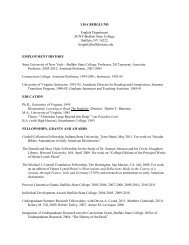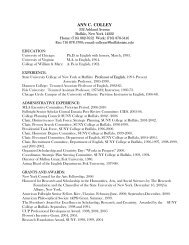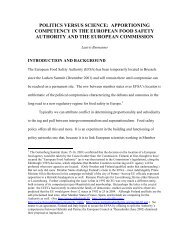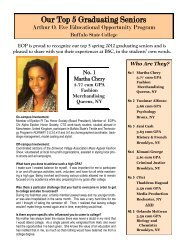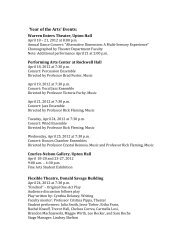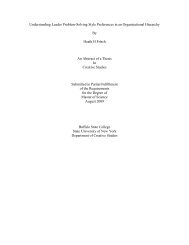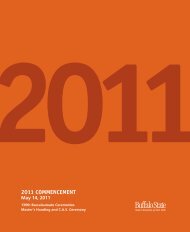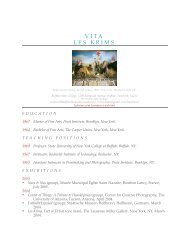Arts - Buffalo State College
Arts - Buffalo State College
Arts - Buffalo State College
Create successful ePaper yourself
Turn your PDF publications into a flip-book with our unique Google optimized e-Paper software.
86<br />
Humanities<br />
I m teh Awes0mx0r: Gamer Speak and<br />
Establishing Hierarchies Online<br />
Jeffrey Gumkowski, HON 400: All <strong>College</strong> Honors Colloquium<br />
Faculty Mentors: Professor A. Michael Vermy, Modern and Classical<br />
Languages and Professor Andrea Guiati, Director, All <strong>College</strong><br />
Honors Program<br />
Language has often been used as a means to separate people<br />
into one category or another, or to establish identities and even rank<br />
in a social order, as can be seen historically in the Catholic Church’s<br />
use of Latin as a means to separate clergymen from the public. This<br />
practice continues today, though in a vastly different venue. The<br />
rise of online gaming has created a new social environment for this<br />
generation, and as a result it has also created the space for new<br />
identities, categories and ranks to be established in this environment.<br />
The language used to fill these spaces is surprisingly different from<br />
everyday English, in orthography, structure and even use. It is an<br />
amalgamation of abbreviations, pictograph-like emoticons, freshly<br />
minted neologisms and deliberate mistakes. For all this, there is<br />
still at least one similar element. Just like the orators of old, verbally<br />
duking it out in the Senate Hall of Rome, write makes might.<br />
Whoever has the best command of the language in a demonstration<br />
of the language can use it to determine where others stand on the<br />
social spectrum, from respected to mocked and outcast. As a result of<br />
a great deal of immersive personal research in environments where<br />
this sort of speech is common, and in the findings of scholars more<br />
established than myself, I would like to demonstrate what can define<br />
“Gamer Speak” and how it is used to create or determine one’s place<br />
in an online social hierarchy.<br />
Presentation Type and Session: Oral – Humanities III<br />
The Impact of Social Media On the Field<br />
of Journalism<br />
Eric LaClair, COM 450: Communication and Society<br />
Faculty Mentor: Professor Michael Niman, Communication<br />
In an age where digital media supersedes legacy media outlets<br />
such as newspapers and magazines, more people have easy access<br />
to news, advertising, and other forms of media. While social media<br />
websites and blogs have allowed for quick and easy dissemination<br />
of information, how have they impacted traditional forms of media<br />
and journalism, and has this impact been positive or negative? The<br />
sixty percent of the population with high speed Internet access can<br />
create a blog, or share their views or ideas on websites like Facebook,<br />
Twitter, and Yelp, but does this make them journalists? Some critics<br />
argue that these newer forms of media have undermined the<br />
integrity of traditional journalists, and that the people writing these<br />
articles, reviews, or stories hold no credibility themselves. However,<br />
there are instances where social media websites break news stories<br />
before media outlets. For example, according to ABC’s Maggy<br />
Patrick, information was originally released on Twitter during the<br />
recent uprisings in Egypt before major media outlets “broke the<br />
news.” I argue that while social media has had both negative and<br />
positive impacts on traditional journalism, it is very clear that the<br />
line between these two forms of media is quickly becoming blurred.<br />
Presentation Type and Session: Oral – Social Sciences<br />
The Integration of Consequentialism and<br />
Deontology<br />
Ryan Harvey, PHI 401W: Respect Seminar<br />
Faculty Mentor: Professor John Draeger, Philosophy<br />
Normative moral theories often fall into one of two broad<br />
categories, consequentialist and deontological. Roughly speaking,<br />
the former contends that morality demands that we work to promote<br />
general welfare, while the latter requires us to follow universal<br />
moral rules. These two theories have been at odds historically.<br />
Consequentialists are traditionally criticized for the willingness to<br />
sacrifice moral rules for the greater good, while deontologists are<br />
criticized for being rule obsessed and unwilling to bend in the face<br />
of negative consequences. There are major difficulties associated<br />
with extreme forms of both views, which have led authors in both<br />
traditions to attempt resolution both internally and by arguing that<br />
parts of the opposing theory can be incorporated successfully. I will<br />
argue that this trend toward integration and moderation is the result<br />
of collective acknowledgment that neither theory can sufficiently<br />
capture the reality of our moral lives, but that both indicate<br />
important components. I will then examine the extent to which such<br />
integration is possible, if at all.<br />
Presentation Type and Session: Oral – Humanities II<br />
Is Captain America Required To Save<br />
the World? An Examination Into<br />
What Morality Requires of Us On an<br />
International Foreground<br />
Nadeen Bawab, PHI 401: Respect Seminar<br />
Faculty Mentor: Professor John Draeger, Philosophy<br />
Does the United <strong>State</strong>s have a moral duty to use force to<br />
protect the human rights of individuals other than their own?<br />
Should the needs of strangers weigh as much as the needs of<br />
family and fellow citizens? What does morality require of us on an<br />
international foreground and what role does proximity play in all<br />
of this? This project will consider two perspectives. Inegalitarians<br />
take intervention to be an imperfect duty, one that is not required<br />
of us. They place the well-being of their own citizens ahead of the<br />
well-being of a nameless person across the world, and believe that<br />
intervention involves putting our own citizen’s life at stake in order<br />
to prevent the deaths of individuals from other countries. On the<br />
contrary, Egalitarians believe that that all human beings deserve<br />
respect for the fact that they are human beings, and therefore they<br />
have a right to life and liberty, and we have a duty to help those<br />
rights prosper. Examining these two viewpoints will help us decide




